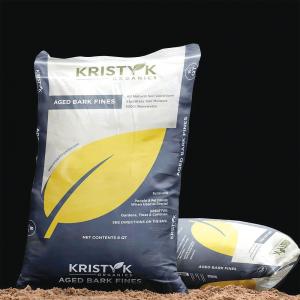Compost Made Their Business Grow
 ✖  |
When Kristy Flowers’ husband Jim, an organic farmer, decided to leave farming, he didn’t leave compost-making behind. He and Kristy took his expertise and his recipe and turned it into a business. Kristy K Organics now makes a variety of products to promote healthy soil, including Jim’s compost.
“We’ve been in business since 2020. COVID made it interesting,” says Flowers. “We were using coir (coconut fiber), and it became hard to get. Plus, we had ordered automated packaging equipment and we couldn’t get anyone to program it for us.”
Products include their Premium Organic Compost (Jim’s recipe), as well as shredded mulch, organic chicken pellets, aged bark fines, pure rice hulls, and rice hulls and coir.
“We started selling in local stores and via our website to customers in Minnesota and Wisconsin,” says Flowers. “Our promotion is mostly through social media with support from friends and family.”
While they have shipped their rice hull products nationally, shipping costs with the heavier products make wider marketing prohibitive. Most recently, Kristy K Organics started working with two distributors to sell to greenhouses.
“Mixing for greenhouses is a new ball game for us,” says Flowers. “They require a lower pH.”
Living in Minnesota, Flowers had the benefit of access to AURI, the state’s Ag Utilization Research Institute. Before starting the business, she and Jim worked closely with AURI researchers. They needed to refine their farm compost recipe to make it better suited for lawns and gardens.
The new recipe combined composted poultry and cow manure from local farms, as well as bark fines. While the cow and poultry manure are not from organic farms, the composting process brings them into organic compliance. The manures provide beneficial nutrients and microbes, but the aged bark adds carbon and enhanced soil structure. Both are vital to the end product. Flowers notes that they aim for a carbon ratio of 30 to 1 to help the bacteria, fungi, and microbes build humus in the soil.
“The compost is a good mix and easy to use,” says Flowers. “You can really build your soils with it.”
Contact: FARM SHOW Followup, Kristy K Organics, 651 Lincoln Loop, Sauk Centre, Minn. 56378 (ph 320-429-6200; grow-with@kristykorganics.com; www.kristykorganics.com).

Click here to download page story appeared in.
Click here to read entire issue
Compost Made Their Business Grow FERTILIZER APPLICATION When Kristy Flowers’ husband Jim an organic farmer decided to leave farming he didn’t leave compost-making behind He and Kristy took his expertise and his recipe and turned it into a business Kristy K Organics now makes a variety of products to promote healthy soil including Jim’s compost “We’ve been in business since 2020 COVID made it interesting ” says Flowers “We were using coir coconut fiber and it became hard to get Plus we had ordered automated packaging equipment and we couldn’t get anyone to program it for us ” Products include their Premium Organic Compost Jim’s recipe as well as shredded mulch organic chicken pellets aged bark fines pure rice hulls and rice hulls and coir “We started selling in local stores and via our website to customers in Minnesota and Wisconsin ” says Flowers “Our promotion is mostly through social media with support from friends and family ” While they have shipped their rice hull products nationally shipping costs with the heavier products make wider marketing prohibitive Most recently Kristy K Organics started working with two distributors to sell to greenhouses “Mixing for greenhouses is a new ball game for us ” says Flowers “They require a lower pH ” Living in Minnesota Flowers had the benefit of access to AURI the state’s Ag Utilization Research Institute Before starting the business she and Jim worked closely with AURI researchers They needed to refine their farm compost recipe to make it better suited for lawns and gardens The new recipe combined composted poultry and cow manure from local farms as well as bark fines While the cow and poultry manure are not from organic farms the composting process brings them into organic compliance The manures provide beneficial nutrients and microbes but the aged bark adds carbon and enhanced soil structure Both are vital to the end product Flowers notes that they aim for a carbon ratio of 30 to 1 to help the bacteria fungi and microbes build humus in the soil “The compost is a good mix and easy to use ” says Flowers “You can really build your soils with it ” Contact: FARM SHOW Followup Kristy K Organics 651 Lincoln Loop Sauk Centre Minn 56378 ph 320-429-6200; grow-with@kristykorganics com; www kristykorganics com
To read the rest of this story, download this issue below or click
here to register with your account number.







